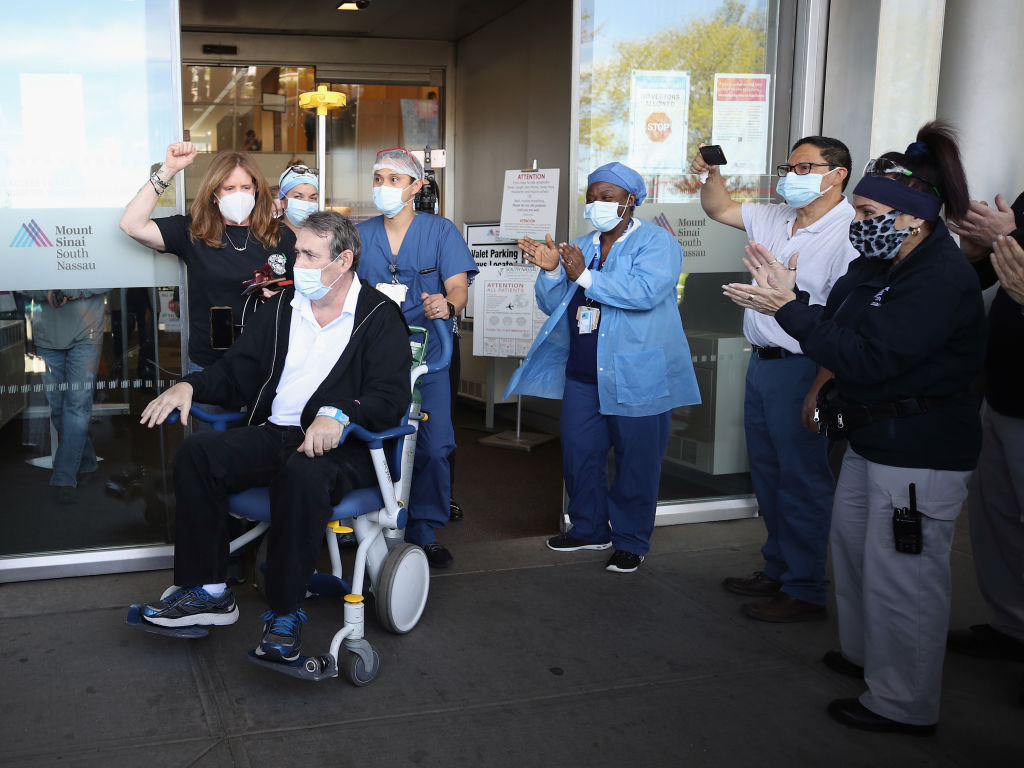COVID-19 survivors as young as 40 often face long, painful recoveries


A free daily email with the biggest news stories of the day – and the best features from TheWeek.com
You are now subscribed
Your newsletter sign-up was successful
"People think that, with COVID-19, 1 percent die and the rest just have flu," virologist Peter Piot, a giant of AIDS and Ebola research, tells The New York Times. "It's not that simple — there's this whole thing in the middle." Piot, 71, should know: The coronavirus "hit me like a bus" in March, he said, and he's only now able to move about for more than 10 minutes at a time. Researchers are still learning about the new coronavirus, but some people fortunate enough to recover still face lung scarring, heart damage, persistent fatigue, blood clots, strokes, neurological problems, and other long-term damage.
People in their 70s or older, like Piot, "are most likely to die from the virus, while younger people generally have a milder form of COVID," Renuka Rayasam writes at Politico. "Survivors in their 40s, 50s, and 60s will likely suffer the longest," experiencing serious aftereffects following more severe infections. The exhaustion and shortness of breath can make it impossible to return to work for a year or more, which can also lead to deteriorating mental health. COVID-19 survivors aren't allowed to join the U.S. military, Rayasam notes.
Middle-aged survivors are "the group that we're concerned about when we discharge," Shari Brosnahan, a pulmonary and critical care doctor at NYU's Langone Health, tells Politico. "If you were an active person with this disease and were in the ICU, your transition away from either being a primary breadwinner or taking care of kids or taking a trip in your retirement, those are things that have been taken away from you."
The Week
Escape your echo chamber. Get the facts behind the news, plus analysis from multiple perspectives.

Sign up for The Week's Free Newsletters
From our morning news briefing to a weekly Good News Newsletter, get the best of The Week delivered directly to your inbox.
From our morning news briefing to a weekly Good News Newsletter, get the best of The Week delivered directly to your inbox.
The 99,000 recorded U.S. COVID-19 deaths grab most of the attention, but it's worth remembering — and keeping in mind — that life hasn't returned to normal for many of the 1.68 million Americans infected with the coronavirus, and it may not feel normal for quite a while.
A free daily email with the biggest news stories of the day – and the best features from TheWeek.com
Peter has worked as a news and culture writer and editor at The Week since the site's launch in 2008. He covers politics, world affairs, religion and cultural currents. His journalism career began as a copy editor at a financial newswire and has included editorial positions at The New York Times Magazine, Facts on File, and Oregon State University.
-
 The Olympic timekeepers keeping the Games on track
The Olympic timekeepers keeping the Games on trackUnder the Radar Swiss watchmaking giant Omega has been at the finish line of every Olympic Games for nearly 100 years
-
 Will increasing tensions with Iran boil over into war?
Will increasing tensions with Iran boil over into war?Today’s Big Question President Donald Trump has recently been threatening the country
-
 Corruption: The spy sheikh and the president
Corruption: The spy sheikh and the presidentFeature Trump is at the center of another scandal
-
 Trump HHS slashes advised child vaccinations
Trump HHS slashes advised child vaccinationsSpeed Read In a widely condemned move, the CDC will now recommend that children get vaccinated against 11 communicable diseases, not 17
-
 FDA OKs generic abortion pill, riling the right
FDA OKs generic abortion pill, riling the rightSpeed Read The drug in question is a generic version of mifepristone, used to carry out two-thirds of US abortions
-
 RFK Jr. vaccine panel advises restricting MMRV shot
RFK Jr. vaccine panel advises restricting MMRV shotSpeed Read The committee voted to restrict access to a childhood vaccine against chickenpox
-
 Texas declares end to measles outbreak
Texas declares end to measles outbreakSpeed Read The vaccine-preventable disease is still spreading in neighboring states, Mexico and Canada
-
 RFK Jr. shuts down mRNA vaccine funding at agency
RFK Jr. shuts down mRNA vaccine funding at agencySpeed Read The decision canceled or modified 22 projects, primarily for work on vaccines and therapeutics for respiratory viruses
-
 Measles cases surge to 33-year high
Measles cases surge to 33-year highSpeed Read The infection was declared eliminated from the US in 2000 but has seen a resurgence amid vaccine hesitancy
-
 Kennedy's vaccine panel signals skepticism, change
Kennedy's vaccine panel signals skepticism, changeSpeed Read RFK Jr.'s new vaccine advisory board intends to make changes to the decades-old US immunization system
-
 Kennedy ousts entire CDC vaccine advisory panel
Kennedy ousts entire CDC vaccine advisory panelspeed read Health Secretary RFK Jr. is a longtime anti-vaccine activist who has criticized the panel of experts
